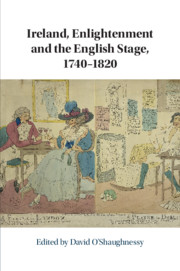Book contents
- Ireland, Enlightenment and the English Stage, 1740–1820
- Ireland, Enlightenment and the English Stage, 1740–1820
- Copyright page
- Contents
- Illustrations
- Tables
- Contributors
- Acknowledgements
- Introduction Staging an Irish Enlightenment
- Part I Representations and Resistance
- Part II Symbiotic Stages: Dublin and London
- Part III Enlightened Perspectives
- Chapter 7 Civility, Patriotism and Performance: Cato and the Irish History Play
- Chapter 8 From Ireland to Peru: Arthur Murphy’s (Anti)-Imperial Dramaturgy
- Chapter 9 The Provincial Commencement of James Field Stanfield
- Chapter 10 Worlding the Village: John O’Keeffe’s ‘Excentric’ Pastorals
- Select Bibliography
- Index
Chapter 8 - From Ireland to Peru: Arthur Murphy’s (Anti)-Imperial Dramaturgy
from Part III - Enlightened Perspectives
Published online by Cambridge University Press: 22 July 2019
- Ireland, Enlightenment and the English Stage, 1740–1820
- Ireland, Enlightenment and the English Stage, 1740–1820
- Copyright page
- Contents
- Illustrations
- Tables
- Contributors
- Acknowledgements
- Introduction Staging an Irish Enlightenment
- Part I Representations and Resistance
- Part II Symbiotic Stages: Dublin and London
- Part III Enlightened Perspectives
- Chapter 7 Civility, Patriotism and Performance: Cato and the Irish History Play
- Chapter 8 From Ireland to Peru: Arthur Murphy’s (Anti)-Imperial Dramaturgy
- Chapter 9 The Provincial Commencement of James Field Stanfield
- Chapter 10 Worlding the Village: John O’Keeffe’s ‘Excentric’ Pastorals
- Select Bibliography
- Index
Summary
This chapter argues that Arthur Murphy’s tragic dramaturgy is more radical than has been recognised, notably in its treatment of the classic Enlightenment concerns with religious toleration and the ‘savage’ or indigenous critique of colonial invasion. Murphy’s serious plays are Drydenic in spatial reach, stretching from East Asia (The Orphan of China [1759]) to Peru (Alzuma [1757/1773]) via Syria (Zenobia [1768]) and Greece (The Grecian Daughter [1772]). Murphy’s imperial dramaturgy swerves from his predecessor’s, however, in focusing on female protagonists and reiterating indigenous or non-European literary historical accounts of colonial conquest and resistance. Contextualising Murphy’s tragic writing via his Irish and Catholic origins (partially subsumed by his later metropolitan British and Anglican affiliations), this chapter explores Alzuma’s reiteration of Voltaire’s and Hill’s Alzire/Alzuma, themselves redactions of Garcilaso de la Vega’s Royal Commentaries of Peru. Noting how Murphy’s profound attachment to his devoutly Catholic mother informs his critique of forced conversion, Orr shows how his dramatisation of the black legend topos is linked to other Irish Patriot uses of this trope, by radical politician Charles Lucas and by well-known Patriot author Henry Brooke, in the latter’s Montezuma [undated].
Keywords
- Type
- Chapter
- Information
- Ireland, Enlightenment and the English Stage, 1740-1820 , pp. 189 - 204Publisher: Cambridge University PressPrint publication year: 2019

